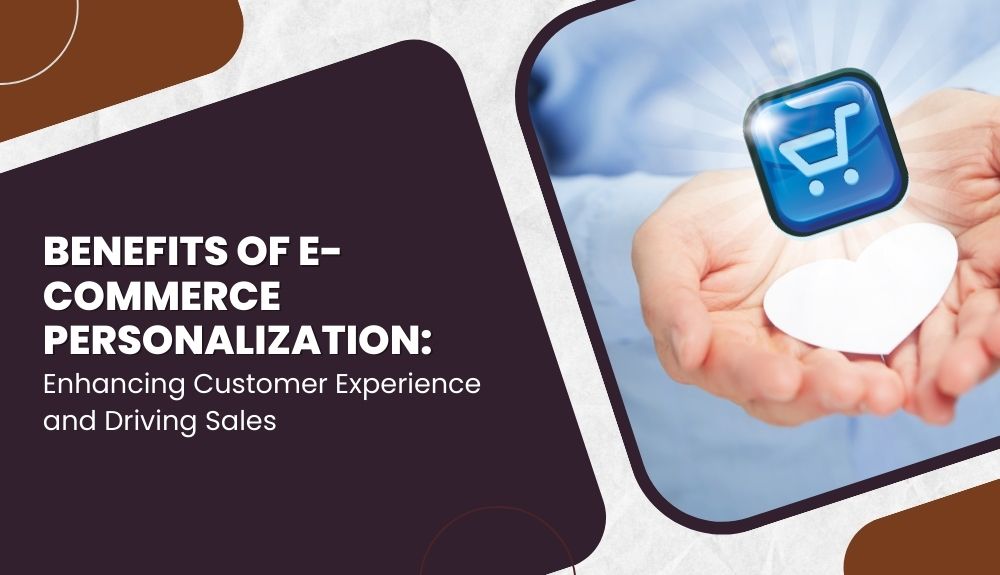Have you ever felt like online stores can read your mind, offering exactly what you’re looking for? Well, that’s the magic of e-commerce personalization. Imagine a virtual shopping experience tailored just for you, where every click feels intuitive and every suggestion hits the mark. This personalized touch is not just a convenience but a strategic move by businesses to enhance customer satisfaction and boost sales.
In our upcoming blog, we will delve into the world of e-commerce personalization, exploring how it revolutionizes customer experiences and drives revenue growth. By leveraging the power of big data analytics, businesses can decode customer preferences, predict behavior, and deliver hyper-personalized shopping journeys. From dynamic pricing strategies to real-time recommendations, we will uncover the myriad benefits and cutting-edge strategies that propel e-commerce platforms to new heights of success.
Join us on this journey as we uncover the secrets behind elevating customer engagement and maximizing conversions through the art of e-commerce personalization. Get ready to unlock the potential of your online business and witness the transformative impact of data-driven customization firsthand.
Introduction to Personalization in E-commerce
Personalization is a game-changer in the world of e-commerce, revolutionizing the way businesses interact with their customers and enhancing the overall shopping experience. By tailoring the shopping journey to individual preferences and needs, e-commerce personalization creates a more engaging and relevant experience for customers.
One of the key benefits of personalization in e-commerce is increased customer loyalty. By delivering personalized product recommendations, customized offers, and tailored content, businesses can nurture a stronger bond with their customers, leading to repeat purchases and long-term loyalty.
Moreover, personalization enhances the customer experience by making it more convenient and enjoyable. Through the use of data analytics and machine learning algorithms, e-commerce platforms can dynamically adapt their interfaces, product displays, and recommendations based on each user’s preferences and behavior. This level of customized experience not only saves time for customers but also assists them in discovering products that align with their interests and style.
Personalization also provides businesses with a competitive advantage. By understanding customer behavior and preferences, e-commerce companies can customize their marketing campaigns, develop targeted promotions, and optimize their product offerings. This enables them to stand out from the competition and create a unique experience that resonates with their target audience.
Ultimately, the integration of personalization in e-commerce allows businesses to gain valuable insights into customer behavior. By collecting and analyzing customer data, companies can understand their customers’ preferences, purchasing patterns, and desires. This data-driven approach empowers businesses to make informed decisions, improve their products, and enhance customer satisfaction.
In conclusion, personalization in e-commerce is not just a trend but a necessity for businesses seeking to thrive in the digital landscape. By delivering tailored experiences, businesses can drive customer loyalty, improve engagement, and gain a competitive edge. The next sections will explore in more detail the benefits of e-commerce personalization and how it can be effectively implemented.
Benefits of E-commerce Personalization
In today’s competitive e-commerce landscape, personalization has emerged as a key strategy for businesses to enhance customer experience and drive sales. By tailoring shopping experiences to individual customers, businesses can create a more engaging and relevant online journey. Let’s explore the advantages of implementing personalized shopping experiences for customers:
1. Increased Customer Loyalty: Personalization fosters a sense of loyalty among customers. When customers feel understood and valued, they are more likely to develop a long-term relationship with a brand, leading to repeat purchases and higher customer lifetime value.
2. Enhanced Customer Experience: Personalization allows businesses to deliver tailored recommendations and offers based on individual preferences, browsing history, and purchase behavior. This level of customization not only saves customers time but also creates a more enjoyable shopping experience, increasing customer satisfaction.
3. Competitive Advantage: Businesses that prioritize e-commerce personalization gain a competitive edge. Tailoring offers and recommendations based on customer data sets them apart from competitors, attracting and retaining customers who crave personalized experiences.
4. Better Understanding of Customer Behavior: E-commerce personalization provides businesses with valuable insights into customer behavior. By analyzing data on customer preferences, purchase history, and browsing patterns, businesses can gain a deeper understanding of their target audience. This understanding enables data-driven decision-making and the optimization of marketing strategies.
It is worth mentioning that personalizing the online shopping experience involves leveraging big data analytics and machine learning algorithms. These technologies enable businesses to collect and process vast amounts of customer data, uncovering patterns and preferences that inform the personalization process. Moreover, the implementation of customer segmentation strategies allows businesses to group customers based on their shared characteristics and preferences, creating more targeted and relevant messaging.
To implement e-commerce personalization effectively, businesses can utilize strategies such as dynamic pricing, on-site targeting, and personalized product recommendations. Integrating customer data across channels and platforms ensures a seamless and consistent personalized experience for customers throughout their journey. By adopting these best practices, businesses can optimize the shopping experience, drive customer engagement, and ultimately boost sales.
In conclusion, the benefits of e-commerce personalization are undeniable. By implementing personalized shopping experiences, businesses can cultivate customer loyalty, enhance customer experience, gain a competitive advantage, and gain valuable insights into customer behavior. The increasing availability of big data analytics and machine learning technologies empowers businesses to unlock the full potential of personalization in e-commerce. With these tools and strategies in place, businesses can create a personalized and impactful shopping experience that sets them apart in the digital marketplace.
The Impact of Big Data Analytics on E-commerce Personalization and Marketing Strategies

The digital landscape has transformed the way businesses operate, and e-commerce has become an increasingly competitive market. To stand out from the crowd, businesses are turning to big data analytics to revolutionize their e-commerce personalization and enhance their marketing strategies. By harnessing the power of data, businesses can now tailor shopping experiences based on individual customer preferences, improving customer engagement and ultimately driving sales.
Machine Learning Algorithms: Personalization at Scale
One of the key drivers of e-commerce personalization is the use of machine learning algorithms. These algorithms analyze vast amounts of customer data, allowing businesses to gain valuable insights into customer behaviors, preferences, and buying patterns. With this information at hand, businesses can then create personalized shopping experiences that cater to individual customer needs, increasing the chances of conversion and customer satisfaction.
Customer Segmentation: Unlocking Targeted Personalization
Big data analytics enables businesses to segment their customers based on various criteria, such as demographics, purchase history, or browsing behavior. This segmentation allows businesses to understand their customers on a deeper level and tailor their marketing strategies accordingly. For example, segmenting customers based on their previous purchases can enable businesses to offer personalized product recommendations, increasing the likelihood of repeat purchases and customer loyalty.
Data-driven Decision-making: Optimizing the Personalization Process
Data-driven decision-making is at the core of e-commerce personalization. By analyzing customer data, businesses can make informed decisions about the types of products, offers, and promotions that will resonate with their target audience. For instance, data analysis can reveal which marketing campaigns have been successful in driving conversions, enabling businesses to refine their strategies and allocate resources more effectively.
Improving Customer Experience and Driving Sales
The impact of big data analytics on e-commerce personalization goes beyond mere customization. It enhances the overall customer experience by delivering relevant content, personalized recommendations, and tailored shopping experiences. When customers feel understood and valued, it increases their satisfaction and builds trust, ultimately leading to higher customer engagement and increased sales.
In summary, big data analytics has revolutionized e-commerce personalization and marketing strategies. Machine learning algorithms enable businesses to deliver personalized experiences at scale, while customer segmentation allows for targeted personalization. Data-driven decision-making optimizes the personalization process, ensuring better customer experiences and driving sales. By harnessing the power of big data, businesses can truly transform their e-commerce offerings and stay ahead in the competitive landscape.
Strategies for Implementing E-commerce Personalization
To successfully implement e-commerce personalization in your business, it’s important to have a strategic approach. Here are some practical strategies and advice to help you enhance the personalized features in your e-commerce platform:
1. Dynamic Pricing:
Implement a dynamic pricing strategy that adjusts product prices based on factors such as demand, customer browsing behavior, and purchasing history. This allows you to offer personalized discounts or incentives to specific customers, increasing their likelihood of making a purchase.
2. On-Site Targeting:
Utilize on-site targeting techniques to personalize the user experience for each visitor. This can include displaying personalized content, offers, or recommendations based on their browsing history, demographics, or previous interactions with your website.
3. Personalized Product Recommendations:
Leverage the power of machine learning algorithms to accurately suggest products to customers based on their browsing behavior, purchase history, and preferences. This can significantly enhance the shopping experience and increase the chances of upselling or cross-selling.
4. Integrating Customer Data across Channels:
Ensure that customer data is seamlessly integrated across multiple channels, such as your website, mobile app, email marketing campaigns, and social media platforms. This allows you to provide consistent, personalized experiences regardless of where the customer interacts with your brand.
5. Customer Segmentation:
Segment your customer base into groups based on their preferences, behavior, demographics, or purchase history. This enables you to deliver targeted and relevant messages, offers, and recommendations to each segment, maximizing engagement and conversion rates.
6. Predictive Analytics:
Leverage predictive analytics to anticipate customer behavior and preferences. By analyzing historical data and patterns, you can make data-driven decisions and proactively personalize the shopping experience for each customer.
7. Effective Inventory Management:
Optimize inventory management processes to ensure that personalized recommendations are based on products that are in stock and available for purchase. This helps avoid customer frustration and enhances the overall shopping experience.
8. Optimizing the Shopping Cart Abandonment Strategy:
Implement strategies to reduce shopping cart abandonment by utilizing personalized follow-up emails, targeted offers, or incentives to encourage customers to complete their purchases. Analyze the reasons behind cart abandonment and tailor your approach accordingly.
By implementing these strategies, you can provide a highly personalized and engaging experience for your customers, resulting in increased customer satisfaction, higher conversion rates, and ultimately, business growth. It’s important to continuously evaluate and refine your personalization efforts based on customer feedback and data analysis to stay ahead in the competitive e-commerce landscape.
Remember, personalization is not a one-time effort but an ongoing process that requires monitoring and optimization to consistently deliver a superior shopping experience to your customers.
Best Practices for E-commerce Personalization
When it comes to implementing personalization in your e-commerce business, there are several best practices that can help you maximize its effectiveness. By leveraging customer segmentation, predictive analytics, effective inventory management, and optimizing the shopping cart abandonment strategy, you can create highly tailored and engaging shopping experiences for your customers.
Leveraging Customer Segmentation
Segmenting your customers based on their preferences, behavior, and demographics is a crucial step in personalization. By dividing your customer base into distinct groups, you can create targeted marketing campaigns and deliver personalized content that resonates with each segment. This allows you to address the unique needs and interests of different customer groups, increasing their satisfaction and engagement with your e-commerce platform.
Utilizing Predictive Analytics
Leveraging predictive analytics enables you to anticipate customer behavior and preferences based on historical data and patterns. By analyzing past purchase behavior, browsing activity, and demographic information, you can make accurate predictions about what products or promotions are most likely to appeal to individual customers. This allows you to deliver personalized recommendations and offers that are highly relevant, increasing the likelihood of conversion and customer satisfaction.
Effective Inventory Management
Maintaining an updated and well-organized inventory is essential for successful e-commerce personalization. By ensuring that your product catalog is accurate and up-to-date, you can provide relevant product recommendations and ensure that customers can easily find what they are looking for. Additionally, effective inventory management allows you to avoid out-of-stock situations, reducing frustration and improving the overall shopping experience for your customers.
Optimizing the Shopping Cart Abandonment Strategy
Cart abandonment is a common challenge faced by e-commerce businesses. However, by implementing a personalized approach to cart abandonment, you can effectively recover lost sales. Send personalized email reminders to customers who have abandoned their carts, offering incentives or discounts to encourage them to complete their purchase. Additionally, analyze the reasons behind cart abandonment and optimize your checkout process accordingly, making it as seamless and user-friendly as possible.
By following these best practices, you can enhance the effectiveness of e-commerce personalization in your business and drive customer engagement and sales. Remember to continuously track and analyze customer data, adapt your strategies based on insights, and stay updated on emerging trends and technologies in the field of personalization. With a customer-centric approach and a focus on delivering tailored experiences, you can stay ahead in the competitive e-commerce landscape.
Overcoming Challenges in E-commerce Personalization

Implementing e-commerce personalization comes with its set of challenges. To provide tailored shopping experiences for customers, businesses need to address several key areas: privacy concerns, understanding customer behavior, and utilizing the right e-commerce technology and data analytics tools.
Privacy Concerns and Data Collection
Collecting customer data is crucial for effective e-commerce personalization, but it must be done with respect to privacy regulations and customer consent. Addressing privacy concerns should be a top priority for businesses. Transparency in data collection practices, clear privacy policies, and secure data handling protocols can alleviate customer apprehensions. Implementing robust data protection measures and ensuring compliance with applicable laws are essential to build trust with customers.
Understanding Customer Behavior
To personalize shopping experiences, businesses need to deeply understand customer behavior. This involves analyzing vast amounts of data to identify patterns, preferences, and purchase history. By leveraging customer segmentation techniques and behavioral analysis, businesses can gain valuable insights into customer preferences, interests, and shopping habits. Understanding the customer journey across various touchpoints enables targeted personalization strategies.
Utilizing the Right Technology and Data Analytics Tools
The success of e-commerce personalization relies on choosing the right technology and data analytics tools. Cloud services and advanced data mining techniques assist in collecting, managing, and analyzing customer data at scale. Machine learning algorithms enable businesses to process vast amounts of data and deliver personalized recommendations and marketing campaigns. Implementing customer data analytics platforms and tools that provide relevant insights and automate the decision-making process can optimize personalization efforts.
In conclusion, while e-commerce personalization offers numerous benefits, businesses must overcome challenges related to privacy concerns, understanding customer behavior, and adopting the right technology and data analytics tools. By addressing these challenges effectively, businesses can create personalized shopping experiences that engage customers and drive sales.
The Future of Personalization in E-commerce
The world of e-commerce is rapidly evolving, and personalization is becoming an increasingly important aspect of the shopping experience. As businesses strive to create meaningful connections with their customers, they are embracing emerging trends that are revolutionizing personalization in e-commerce.
Integration of AI and Machine Learning
One of the significant advancements in personalization is the integration of artificial intelligence (AI) and machine learning algorithms. These technologies empower e-commerce platforms to analyze vast amounts of customer data and deliver tailored experiences in real-time. By leveraging AI, businesses can automate and optimize personalization efforts, ensuring that each customer interaction is relevant and valuable.
Shaping Marketing Strategies with Big Data
Big data plays a vital role in shaping marketing strategies for e-commerce businesses. With access to extensive customer data, businesses can gain valuable insights into customer behavior, preferences, and purchasing patterns. This information allows them to create targeted marketing campaigns, personalized product recommendations, and customized shopping experiences. By harnessing the power of big data analytics, businesses can make data-driven decisions and optimize their marketing efforts to maximize conversions.
Increasing Demand for Personalized Experiences
In today’s digital landscape, customers have come to expect personalized experiences from the brands they interact with. The demand for personalized shopping experiences is on the rise, driven by the desire for convenience, relevancy, and a seamless buying process. As e-commerce businesses embrace personalization, they can build stronger relationships with their customers, increase customer satisfaction, and foster long-term loyalty.
The future of personalization in e-commerce is promising. As AI and machine learning continue to advance, businesses will have even more sophisticated tools at their disposal to deliver hyper-personalized experiences. Furthermore, the role of big data in shaping marketing strategies will become increasingly significant, allowing businesses to better understand their customers and cater to their needs. By embracing these emerging trends, e-commerce businesses can stay ahead of the curve and provide the personalized experiences that customers crave.









